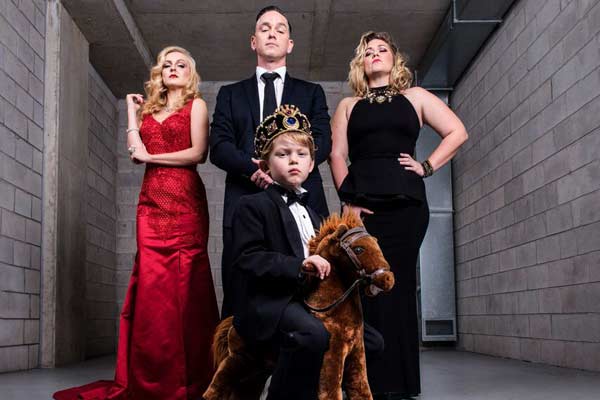History is (more or less) bunk, but King Richard III is alive and kicking.
His reputation is for kicking aggressively. He should be kicking Shakespeare's arse, according to Marcel Dorney and Daniel Evans (two immensely talented playwrights), because Shakespeare played on his deformity to correspondingly twist his reputation.
Their rich and complex new work, 'The Tragedy Of King Richard III', aims to kick back for Richard. Don't be fooled: Shakespeare it ain't, but then arguably (as one departing punter put it) Shakespeare might have been easier to understand...
We start with the familiar opening line. "Now..." says Naomi Price, giving the audience a microsecond to feel that there is going to be Shakespearian text in this production, before continuing "let's agree to do this differently." And different it is.
Her 'prologue' continues, challenging the audience on how we bring our interpretation to what we see, declaring that anyone who says they know history is lying or self-deceived, and setting the aggressive mental landscape for the bloody dissection of Shakespeare's and Richard III's history.
The actors start on the outside and define the central theatrical space (the production is in the round). Initially it's a car park ("let's agree" because nothing is certain in history) in Leicester where a deformed and mutilated body was unearthed in 1995 soon identified as the last English king to die in battle, Richard III.
The set is simple and flexible: a central slab of marble-like stage with a raised lip (for containing the gore) that melds into the black pit surrounding it. It allows for a variety of moods supported by the lighting design. The pit contains trapdoors where the actors acquire props for the various scenes they present without having to leave the action: they, and we, are always participating, as observer or protagonist. We are meant to experience that both roles create the reality, the history.
The play features some outstanding young acting talent, the youngest, Atticus Robb, the most impressive. The cast was generally very strong but the didactic script sometimes got the better of them.
There are some hilarious scenes, often aping TV culture (a favourite of Evans), such as when Shakespeare is pitching Richard III, thinking up new words and phrases in response to the judges' buzzers. Or when the young Richard, being left behind by his brothers, calls them back to hammer them straight that he will be the great York warrior, stabbing the air in moral victory before breaking into a triumphant dance (to modern rap).
There are emotive scenes too; we see Richard's consciousness as an adolescent that his body is becoming malformed and he will be regarded as possessed by the devil. But we are quickly thrown out of any empathy with Brechtian efficiency: nothing, not this play, nor Shakespeare's, nor the history behind it, is real.
The scenes are numerous and varied, but don't really follow any chronological or logical order. We are told at the beginning we know everything we need to know (even if you don't know Shakespeare or history) but it would be a struggle to keep up without any background knowledge. Apart from deconstructing and reconstructing possibilities of Richard, there is little character development (in fact there are few characters as you normally think of them). The piece is jam-packed with interesting ideas and juxtapositions but many are so fleeting and under-developed that it's a struggle not to be confused by it all. The lack of any organising narrative may be purposeful but is also throttling.
So what is this play aiming for? The introduction outlined a key theme: the unreliability of history fed by the propaganda machine (here largely attributed to Shakespeare), the demonization of the other, and the part we play in the bias. But what develops from there? There were a couple of references to Australia's relationship to this creation of English history. And when talk of writing others' stories emerged it seemed a destination (appropriating Aboriginal history) may have been found; but it wasn't explored. The play certainly does things differently, and that can be great. But it's hard to grasp what the driving principals are or be convinced by its kaleidoscope of arguments.
Shakespeare is complex for us in 2016 partly because of old language and partly because of contemporary references and context (that we can only take more or less educated guesses at). Drama, however, was the medium that reached the masses and the illiterate. This was why it was so suitable for propaganda: playwrights communicated with the populace. Shakespeare had the dramatic craft to communicate powerfully.
'The Tragedy Of King Richard III' has potency and wit but not clarity: kind of exciting, but we're stuck in the winter of discontent.
★★★☆☆
'The Tragedy Of King Richard III' performs La Boite until 11 June.

